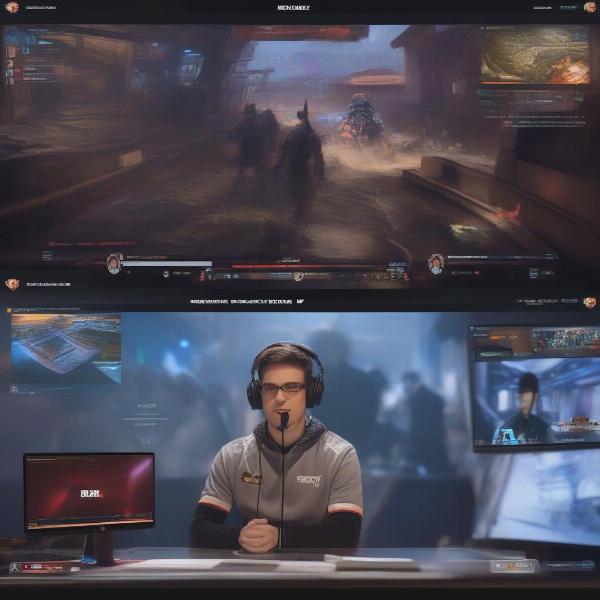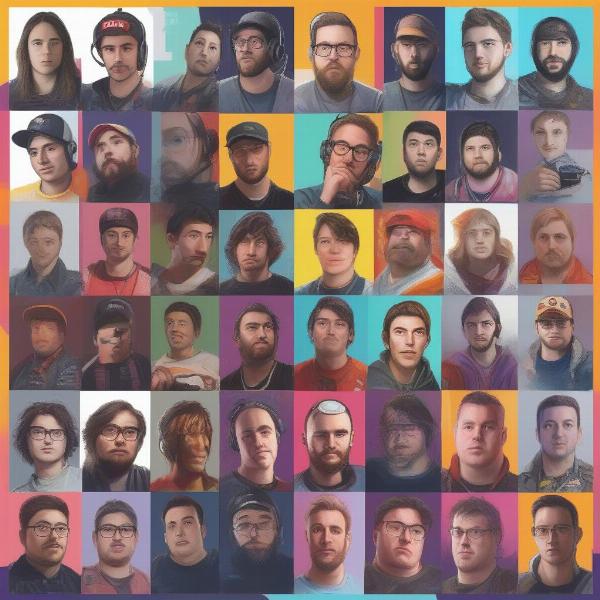The quest to crown the world’s greatest gamer is a complex one. It’s a title hotly debated, with no single definitive answer. Unlike traditional sports with clear scoring systems, the diverse world of gaming makes it difficult to compare apples and oranges. Who’s better: the FPS god, the RTS mastermind, or the fighting game prodigy?
A simple search for “who is the world’s greatest gamer” reveals the immense scope of this question. Are we talking pure skill, earnings, influence, or a combination of all three? This very ambiguity is what makes the discussion so captivating. For some, it’s about mechanical prowess, lightning-fast reflexes, and an almost preternatural ability to read opponents. Others might prioritize strategic thinking, the capacity to analyze complex situations and orchestrate victory from seemingly impossible odds. And then there’s the impact a player has on the community, their influence, and their ability to inspire.
Defining “Greatest”: Skill vs. Impact
So, how do we even begin to define “greatest”? One approach is to focus on competitive gaming. Esports has provided a platform for incredible displays of skill, with players pushing the boundaries of what’s humanly possible in games like League of Legends, Dota 2, and Counter-Strike: Global Offensive. These professional gamers dedicate their lives to honing their craft, and their achievements are undeniable. But does competitive success automatically equate to being the “greatest”?
Another perspective emphasizes a gamer’s broader impact. Consider streamers who have built massive communities, entertaining millions and shaping the gaming landscape. Their influence extends beyond competitive play, impacting game development, popular culture, and even charitable causes. While they may not dominate tournaments, their contributions to the gaming world are immense. Think about figures like Ninja or Shroud, whose popularity has transcended the gaming sphere. Could they be considered among the greatest, even without a string of championship titles?
The Multifaceted Nature of Gaming Skill
Gaming skill itself is multifaceted. Reflexes and precision are crucial for fast-paced action games, but strategic depth and adaptability are paramount in strategy games. Different genres demand different skill sets. A StarCraft II pro might struggle in a fighting game, and vice versa. This makes direct comparisons challenging. Is it even fair to compare a Street Fighter champion to a World of Warcraft raider?
Further complicating the matter is the constantly evolving nature of gaming. New games, genres, and technologies emerge all the time, demanding new skills and strategies. What was considered “skill” a decade ago might be obsolete today. This dynamic landscape makes it difficult to declare anyone the undisputed “greatest” for all time.
 Greatest Gamer: Skill vs Impact
Greatest Gamer: Skill vs Impact
Exploring Different Measures of Greatness
Let’s delve into different ways to measure a gamer’s “greatness.” Tournament wins are a tangible metric, offering a clear indication of competitive dominance. Players like Faker in League of Legends or s1mple in CS:GO have achieved legendary status through their consistent tournament victories. However, focusing solely on tournament results might overlook other important aspects.
Another metric is earnings. Professional gamers can earn significant sums through prize money, sponsorships, and streaming revenue. While financial success doesn’t necessarily equate to skill, it does reflect a player’s overall impact and marketability. This raises another question: Does earning potential contribute to a gamer’s “greatness”?
Who Are Some Contenders?
So, who are some contenders for the title of “world’s greatest gamer”? The list is long and varied, including esports legends, streaming giants, and even speedrunners who push the limits of games in unexpected ways. Names like Daigo Umehara, Johnathan Wendel (Fatal1ty), and Lee Sang-hyeok (Faker) are frequently mentioned in these discussions. Each has achieved extraordinary feats in their respective domains. But can any one of them definitively claim the title of “greatest”?
 Legendary Gamers Across Genres
Legendary Gamers Across Genres
The Subjective Nature of “Greatest”
Ultimately, the title of “world’s greatest gamer” is subjective. It depends on individual criteria and preferences. There’s no right or wrong answer. The beauty of gaming lies in its diversity, offering a space for everyone to find their niche and excel in their own way. While we may never definitively answer the question, the ongoing debate sparks fascinating conversations about skill, impact, and the evolution of gaming itself. Similar to figuring out how to beat world's hardest game, achieving greatness is a challenging yet rewarding pursuit.
Beyond Competition: The Joy of Gaming
It’s important to remember that gaming is, at its core, about fun and enjoyment. While competition is a significant aspect, it’s not the only one. Many gamers find joy in exploring virtual worlds, connecting with friends, and experiencing compelling narratives. For them, “greatness” might be measured by personal achievements, the bonds they forge, or the memories they create. This broader perspective reminds us that gaming is a rich and diverse tapestry, with room for all kinds of players.
 The Joy of Gaming
The Joy of Gaming
Conclusion
The question of “who is the world’s greatest gamer” remains unanswered and perhaps unanswerable. The very nature of gaming, with its diverse genres and constantly evolving landscape, makes it impossible to crown a single champion. However, the ongoing debate highlights the incredible skill, dedication, and impact of gamers worldwide. Ultimately, the search for the “greatest” reminds us of the power and enduring appeal of gaming itself.
FAQ
- Is there an official ranking for the world’s greatest gamer? No, there’s no single official ranking. Different organizations and publications may have their own lists, but there’s no universally recognized authority.
- How important are tournament wins in determining a gamer’s greatness? Tournament wins are a significant factor, but they don’t tell the whole story. Other factors like influence, sportsmanship, and community impact also play a role.
- Can someone be considered a great gamer even if they don’t play competitively? Absolutely! Gaming encompasses much more than just competition. Streamers, content creators, and even casual gamers can contribute significantly to the gaming community.
- Does the definition of “greatest gamer” change over time? Yes, the criteria for “greatness” evolve alongside gaming itself. New genres and technologies emerge, demanding new skills and strategies.
- Who are some of the most commonly cited contenders for the title? Names like Faker, Daigo Umehara, and Ninja are often mentioned, each representing different facets of gaming excellence.
- Is it possible to objectively determine the world’s greatest gamer? No, the concept of “greatest” is inherently subjective. Different people will have different criteria and opinions.
- What’s the most important thing to remember about the “greatest gamer” debate? Gaming should be about fun and enjoyment. While competition is a part of it, the ultimate goal is to have a positive and enriching experience.

